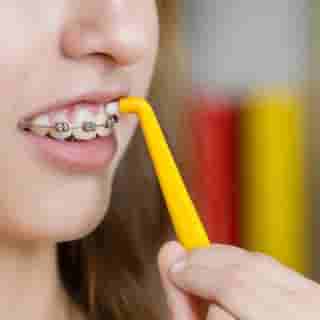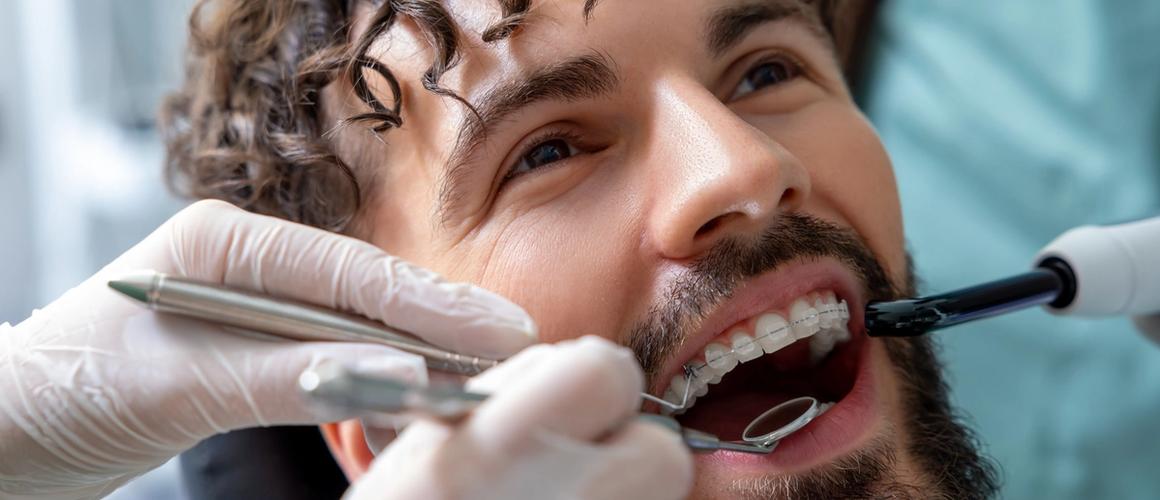- Home
- Braces and Oral Hygiene
Braces and Oral Hygiene
Maintaining Oral Health During Orthodontic Treatment
Good oral hygiene habits today can help shape your smile for years to come. Orthodontic treatment—whether using traditional braces or clear aligners like Invisalign—is an exciting step toward a healthier, straighter smile. However, this journey comes with unique oral care challenges that require extra attention and diligence.
At The Brace Place, we understand that oral health isn't just about aesthetics; it's crucial for your overall well-being. In this article, we'll clearly outline essential daily care routines, dietary tips to protect your teeth and braces, and practical advice on handling any unexpected orthodontic issues that might arise during your treatment.

Daily Oral Care Routine
A consistent daily oral care routine is the foundation of good oral health during orthodontic treatment. Braces and aligners create additional places where food can become trapped, making careful oral hygiene especially important.
Follow these essential practices to keep your teeth and gums healthy:
- Brush After Every Meal: Brushing after each meal prevents food particles from staying trapped around brackets, wires, or aligners, reducing the risk of cavities and gum inflammation.
- Use Orthodontic Toothbrushes: Special toothbrushes designed for braces can more effectively clean around wires and brackets.
- Rinse Regularly: Use antimicrobial or fluoride mouthwash to reduce bacteria, prevent gum disease, and strengthen tooth enamel.
- Utilise Oral Hygiene Tools: Interdental brushes, water flossers, and proxy brushes are helpful additions to your daily routine, effectively removing stubborn food particles.
- Be Thorough and Consistent: Take your time to ensure thorough cleaning, reaching all areas around your braces or aligners. Regular, diligent care greatly reduces the risk of dental problems.
- Maintain Frequency: Ideally, brush after every meal and floss daily. If that's not always feasible, at least rinse your mouth well after eating and brush at your earliest convenience.
Adhering to these habits will significantly enhance your oral health throughout orthodontic treatment.

Love Your Smile
Chat with a Specialist Orthodontist about your treatment options
Nutrition and Diet During Treatment
Your diet greatly affects your oral health, especially when undergoing orthodontic treatment. Choosing the right foods can improve your comfort, protect your braces or aligners, and maintain a healthier smile.
Consider these dietary guidelines during treatment:
- Avoid Sugary and Acidic Drinks: Minimise consumption of sugary beverages like fizzy drinks, fruit juices, and energy drinks, as they contribute to tooth decay and enamel erosion.
- Steer Clear of Sticky or Hard Foods: Chewing gum, hard sweets, nuts, and sticky treats can damage braces, increase cavity risk, and complicate cleaning. Choose orthodontic-friendly alternatives instead.
- Stay Hydrated with Water: Regularly drinking water throughout the day washes away food particles and maintains saliva production, naturally protecting your teeth.
Eating orthodontic-friendly foods and avoiding potentially damaging ones will help ensure your treatment proceeds smoothly.
Building Good Oral Hygiene Habits
Developing sustainable oral care habits can make a significant difference during orthodontic treatment. Good habits ensure consistent care, protect your teeth and braces, and support lasting oral health.
Follow these strategies to establish and maintain effective habits:
- Start Small: If you struggle with flossing, commit to flossing for just one minute every night. Gradually increase the duration as the habit becomes easier.
- Be Consistent: Establish a daily routine by choosing specific times (e.g., brushing after breakfast, flossing before bedtime). Regular repetition reinforces positive habits.
- Set Yourself Up for Success: Make healthy choices easier—for instance, don’t buy sugary foods or drinks that could tempt you later.
- Make It Obvious: Keep your toothbrush, toothpaste, and floss clearly visible and accessible. Easy visibility prompts regular use.
- Use Visual Reminders: Post a note on your bathroom mirror or set phone reminders to prompt you to complete your daily routine.
- Link New Habits to Existing Ones: Pair your oral care routine with an existing habit, such as brushing your teeth immediately after your evening shower or skincare routine.
- Bounce Back Quickly: If you miss a day or slip up, don’t get discouraged. Immediately resume your regular routine at the next opportunity.
- Reward Your Efforts: Rewarding yourself after reaching certain milestones—like consistent brushing and flossing for a week—helps reinforce good habits.
- Get Support: Share your goals with friends or family members who can hold you accountable and encourage your progress.
By embracing these habits, you'll achieve lasting improvements to your oral hygiene.
The Importance of Regular Dental Check-ups
Routine dental visits are crucial during orthodontic treatment, complementing your regular orthodontic check-ups. These appointments ensure your teeth, gums, and braces remain in optimal condition.
Orthodontic and dental check-ups serve distinct yet complementary purposes:
- Orthodontist Visits: Focus on aligning your teeth and assessing progress, ensuring your braces or aligners function effectively.
- Dental Visits: Assess overall oral health, monitoring the health of your teeth and gums to prevent decay or gum disease.
Regular check-ups enable early detection of potential issues, providing peace of mind and supporting your overall treatment success.
Tips for Parents of Young Orthodontic Patients
When children or teenagers undergo orthodontic treatment, parental support plays a crucial role in their dental health and treatment success. Your active involvement encourages positive habits and improves treatment outcomes.
Here’s how parents can best support their children:
- Encourage Consistency: Gently remind your child about brushing and flossing routines to foster consistent oral care habits.
- Assist When Necessary: Younger children might need help flossing or cleaning braces effectively, especially in the early stages of treatment.
- Monitor Diet: Help your child make orthodontic-friendly dietary choices, limiting sugary and hard foods that could harm braces.
- Stay Positive: Reinforce positive attitudes about treatment, encouraging patience and resilience when facing challenges or discomfort.
- Attend Appointments Together: Regularly attending orthodontic appointments with your child helps you understand their progress and supports open communication with the orthodontist.
Your proactive support can ensure your child has a positive orthodontic experience, resulting in a healthier and more confident smile.
Your Smile, Your Responsibility
Maintaining excellent oral health during orthodontic treatment is essential for achieving the best results. Whether you've chosen traditional braces or Invisalign aligners, your daily commitment to oral hygiene and mindful dietary choices significantly influences the success of your treatment.
By following the practical tips outlined in this guide—such as maintaining a thorough oral care routine, establishing healthy dietary habits, attending regular dental and orthodontic check-ups, and developing strong oral hygiene habits—you'll be well-equipped to keep your smile healthy throughout your orthodontic journey.
Remember, taking responsibility for your oral health not only ensures a successful treatment outcome but also contributes significantly to your overall health and self-confidence.









